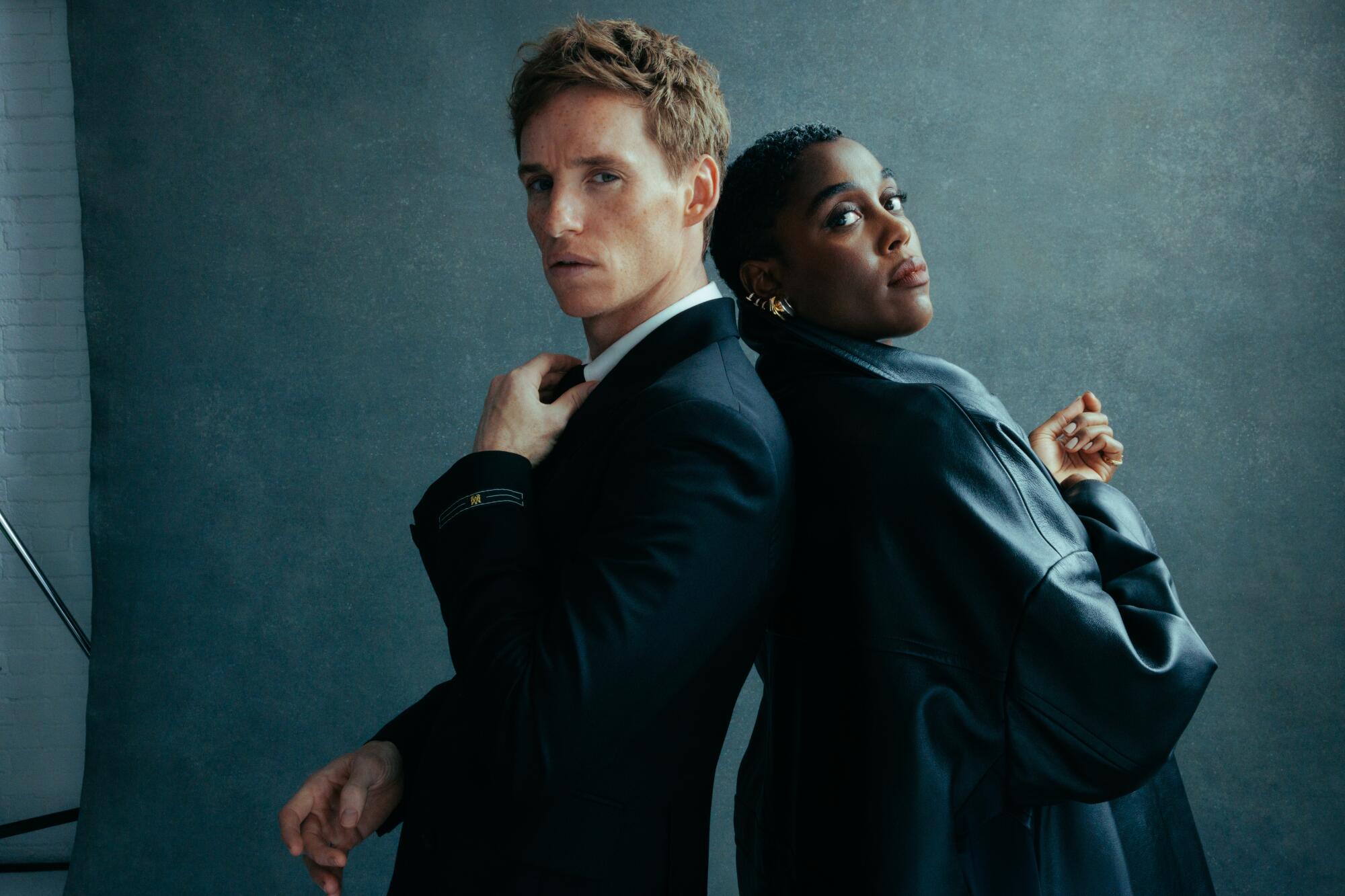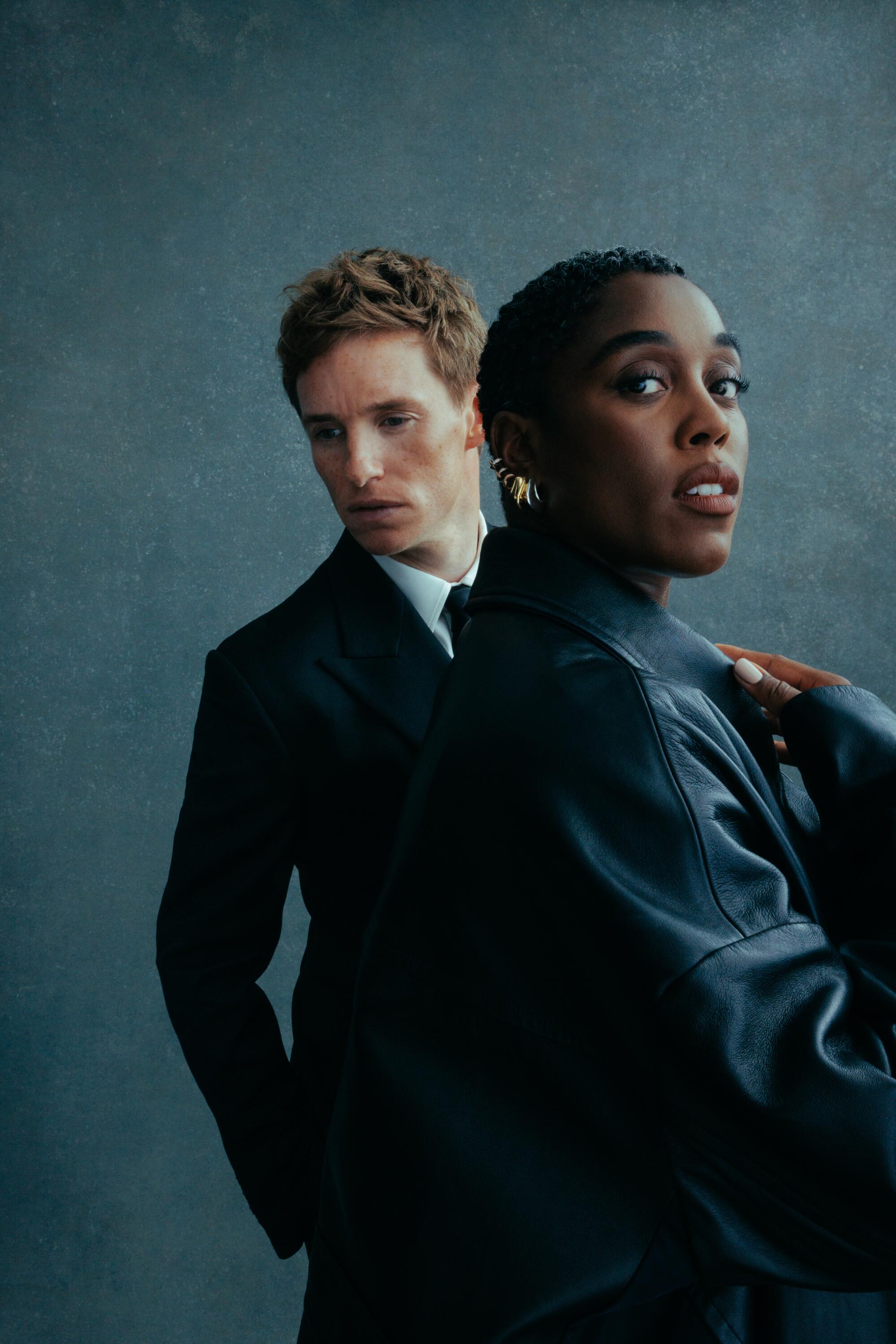
- Share via
Eddie Redmayne and Lashana Lynch first met in a London gym. Lynch was mid-plank and, as Redmayne describes her, “very chill.” Both were about to commence preparation for “The Day of the Jackal” and it felt fitting to connect in a space that requires such intense concentration.
“There’s a mutual scream that happens when you know you’re about to dive into something that is going to be rich in experience, but is also maybe going to test you and pull you and stretch you as an actor,” Lynch says.
The pair are sitting side by side in the Corinthia Hotel the day after the show’s London premiere, and their giddiness about the series is palpable. “That gym experience kept me in a mental plank for a long time where I was able to just focus on process. And we’re two actors who love process and the physicality of characters,” she says.
“But what was weird about that gym moment was that it was right at the start of the thing and I was like, ‘OK here we go,’” Redmayne adds. “And then we basically didn’t see each other for another eight months.”

“The Day of the Jackal,” a 10-episode limited series written by Ronan Bennett that premieres Thursday on Peacock, is a contemporary reimagining of Frederick Forsyth’s 1971 novel and the 1973 film, directed by Fred Zinnemann. Producers Gareth Neame and Nigel Marchant, who helm Carnival Films, acquired the rights through a deal with Universal, but were reluctant to remake the seminal movie. After numerous discussions, Neame realized they could take a similar approach as they had with “Downton Abbey,” which originated from the film “Gosford Park.”
“We’re definitely not remaking that film because you just couldn’t make it better,” Neame says. “But we could take that concept and lean into the strengths of episodic television — character development and multi-seasons — and make it in a whole different dramatic form.”
The producers immediately looked to Redmayne to play the titular Jackal, a scrupulous British long-range assassin with an enigmatic quality. “We were very conscious of the fact that he seems to be attracted to characters that require a lot of preparation, physicality, voice work, accents, make up,” Neame says. “Eddie, it seemed to us, was a meticulously organized, detail-oriented person, and that is exactly what this character is.”
Still, Redmayne says he had a “level of trepidation” when the first three scripts landed in his inbox.
“It was a film I grew up on and held in high esteem, but when I read those first three scripts, not only was it completely contemporary and therefore of another world, but it retained that analog quality,” he says. “It was about the spy craft. But really what I found was how propulsive it was. It was the sort of television I love to watch.”

After Redmayne signed on as the star and an executive producer, the team went out to Lynch to play Bianca, an intelligence officer with an expertise in firearms and a similarly obsessive approach to her work. The actress had famously played a new iteration of 007 in the James Bond film “No Time to Die,” after which she felt she had suitably exhausted the world of MI6. Redmayne says she has “an effervescence and a dexterity and can play all colors of emotion,” which was why she felt right for Bianca. He wanted to speak to her about the project directly, but, as he remembers it, “she never took my call.”
Lynch was hesitant about the project. “On ‘The Woman King’ I did all my stunts and that was a wonderful challenge and I’m so proud of myself, but [I thought], ‘I’ll probably never do that again,’” she says. She followed “Woman King” with “Bob Marley: One Love,” starring as Rita Marley, because she was seeking something that was tender, emotional and physically calm. “Jackal” seemed like the opposite, so it “was an absolute no.”
“Not only was it espionage, but there were stunts,” she says. “Then when I eventually read the first three episodes, I just thought, ‘OK, I get it.’ And I could just feel Eddie’s energy from across the world.”
The edge-of-your-seat series weaves together a cat-and-mouse chase across Europe, with Bianca searching for an assassin — the Jackal — who is leaving a trail of bodies in his wake as he continually evades authorities. Both have family lives that are jeopardized by their work and there’s an uncanny parallel between the two, even though their paths rarely intersect. They’re exacting and skillful at their jobs, but chaos follows and mistakes are made that have detrimental, often deadly, effects. Lynch says she’s “never played a character so messy.”
“The good guys always making the good decisions and the bad guys making all the bad decisions is not representative of the human experience,” Lynch says. “Because everything comes from something, whether it be a bad experience or a trauma or something that has led you to want to go down the wrong path. It’s nice that we as audience members get to have that conversation with ourselves when watching characters like these as a reminder that you are one decision away from doing a bad thing.”
Every character on the show is “on a moral spectrum,” Redmayne says. These include Bianca’s boss Osita Halcrow (Chukwudi Iwuji) and billionaire Ulle Dag Charles (Khalid Abdalla), the primary target throughout the episodes. For Redmayne, this gray area between right and wrong “spoke to the moment.”
“What I found intriguing was you have these two characters, both of whom are meticulous and obsessive and relentless and talented and two sides of the same coin, on this one-way path to collision,” he says. “But they’re also deeply morally ambiguous.”
Lynch, also an executive producer, took a lot of agency over Bianca. She brought in Morris Roots, who worked on “Bob Marley,” to create the character’s wigs.
“Hair is really important to me,” Lynch says. “I saw her having locks and locks aren’t something that we ever see, even in the media, outside of Rastafarianism. I wanted to take that into a professional space.”

She also collaborated with the costume team on Bianca’s casual approach to fashion, which included sneakers, T-shirts and bomber jackets. “It just made for a much more out-of-the-box female experience at work when we’re so used to seeing a very clean cut, high-heeled, manicured version of a woman,” Lynch says. “It reeducates the industry about what men and women [in intelligence] should look like because it’s not always slick and it’s not always together, but it is always beautiful in its own way.”
Redmayne, too, was deeply involved in both his character and the vision of the overall series. Neame says the actors’ thoughtful involvement made the final product “even better.”
“We were fully in the weeds, which was wonderful and it was really important,” he says of the process. “There were so many collaborators on the series, but actually since Lashana and I were on the set every day, we became the continuity between the episodes and the four directors. Not to say that as an actor, you’re not encouraged to bring things in normally, but it was something that we quite vocally wanted.”

“I’d come from the past few years being determined to not look at the monitor and not to analyze myself,” Lynch adds. “But here I was, even looking at the things that we’d thrown away, all of the rushes, and picturing what the edit could look like. You’re piecing together these tiny little squares, these little moments that are going to amount to so much onscreen in the end.”
The episodes unfold with the thrilling speed and sense of unnerving propulsion, but there’s also space for the audience to better understand what drives the assassin and the spy who’s looking for him. Redmayne describes the original onscreen Jackal as charismatic, but still opaque. His backstory and motivations are elusive, but in this version there’s a stronger sense of why. Redmayne recalls a David Bowie interview he saw where the musician was stripped of his personas.
“It was one of the first times he’d done an interview not in a guise and I was struck by quietly still he is in his eyes, how he listens, but also what he says about what those guises are and how he feels at his most comfortable when he’s playing someone else,” Redmayne says. “That resonated with me. I’m not saying this performance is inspired by Bowie, but I found it interesting. Perhaps there’s more comfort in different versions of yourself than not knowing quite who you are.”
Ultimately, “The Day of the Jackal” is a tumultuous ride that questions how we justify our actions with right and wrong. Its ending veers away from the source material, suggesting there could be more seasons of the show if it does well.
“The book and the movie have a very, very definite ending to them,” Neame acknowledges. “But, of course, we’re episodic producers and a show of this scale, if it succeeds, you’re always going to want to try and bring it back one way or another.”
More to Read
The complete guide to home viewing
Get Screen Gab for everything about the TV shows and streaming movies everyone’s talking about.
You may occasionally receive promotional content from the Los Angeles Times.






